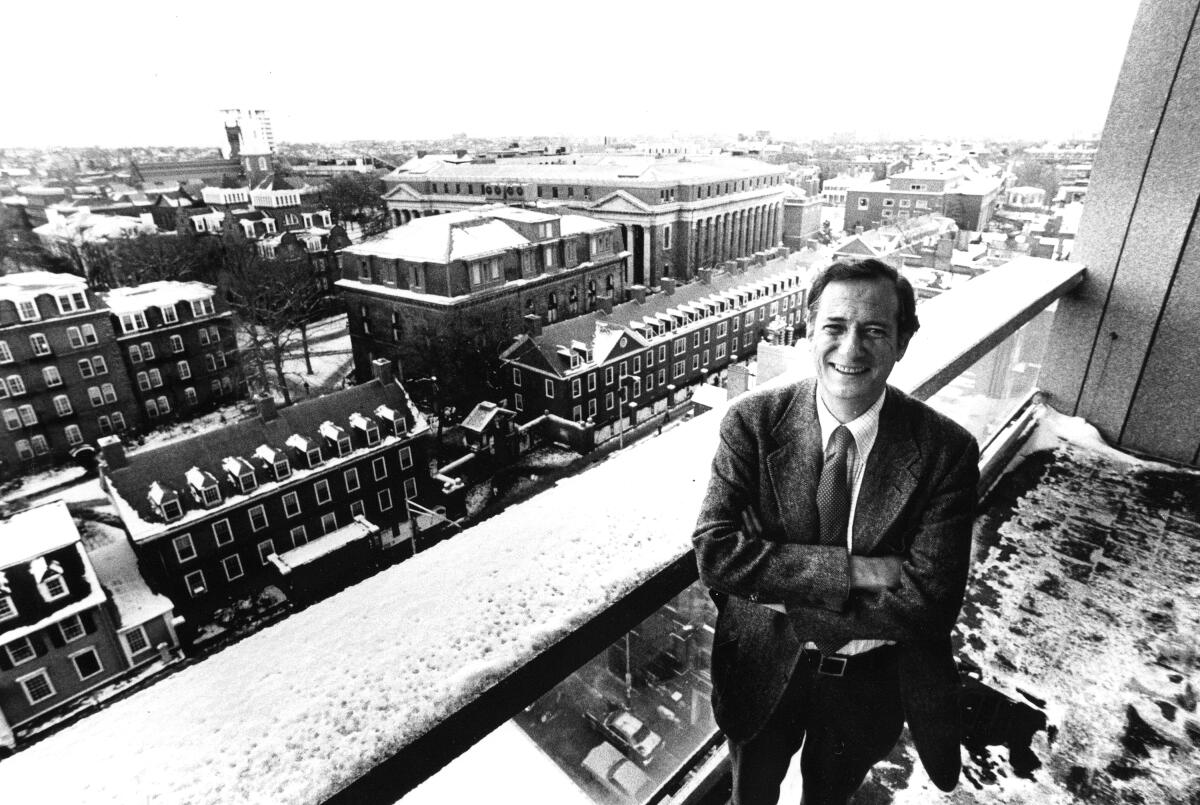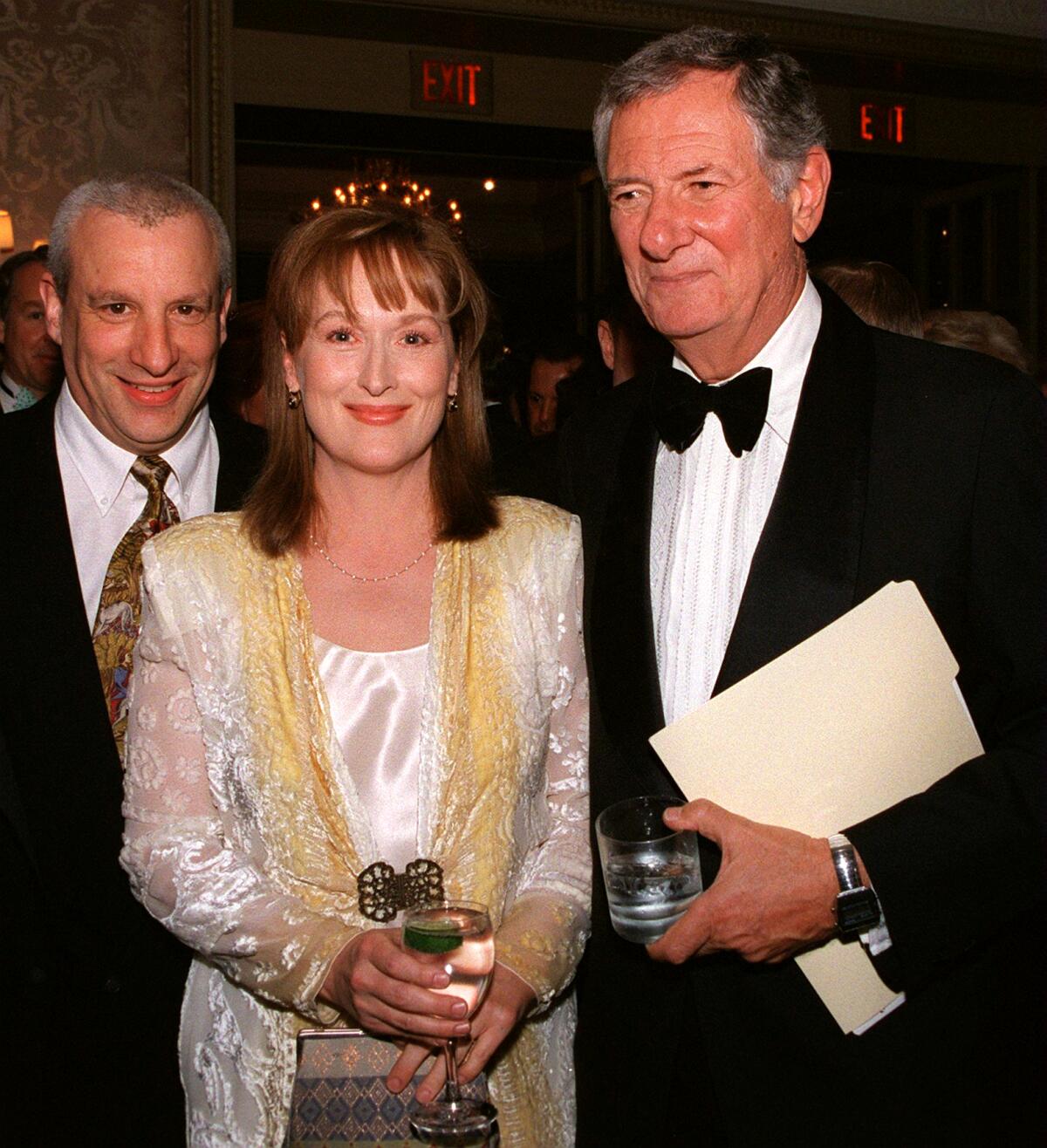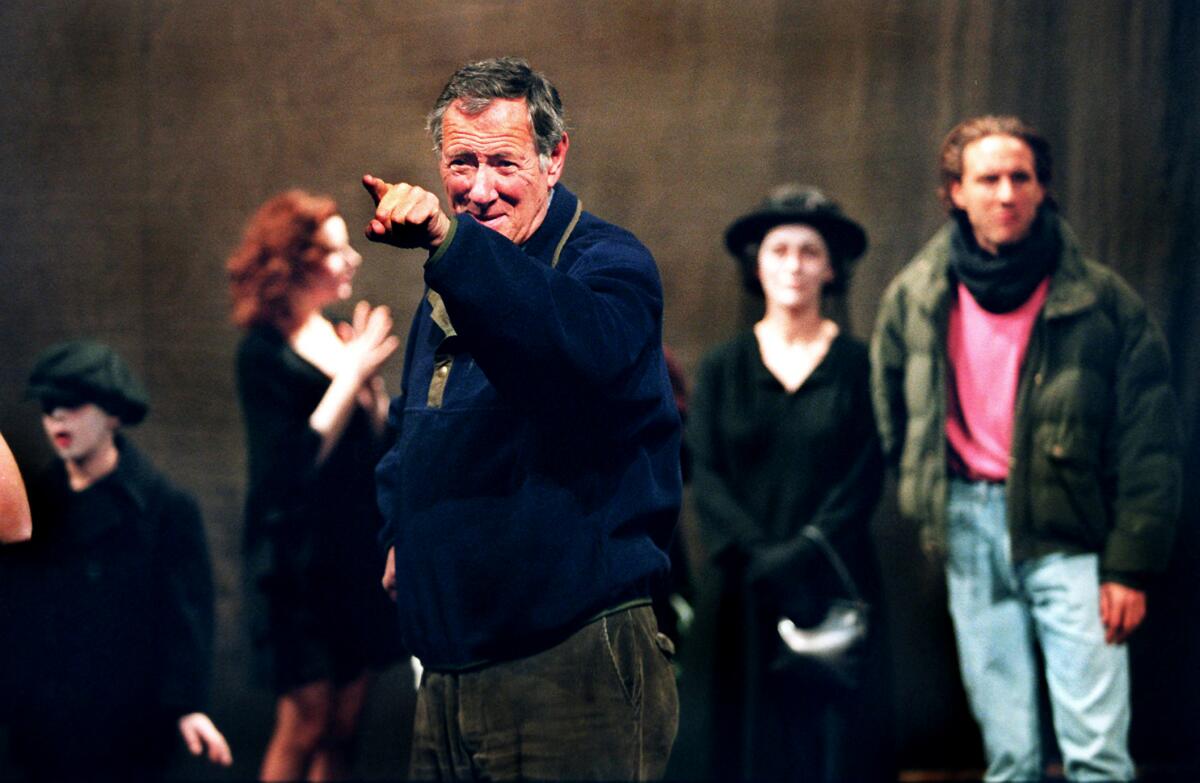Robert Brustein and the double-edged sword of authority in criticism

- Share via
Shortly after being banished, a disguised Kent flatters King Lear by telling him that he has that quality that leads other men to follow. “What’s that?” Lear demands. “Authority,” Kent replies, sealing his return to royal service.
Authority is a quality that critics not long ago were proud to possess. Authority rooted in knowledge, taste and judgment.
But authority now is looked at skeptically. Expertise is second-guessed by those whose main qualification is social media access.
Lear, who achieves true regal stature after divesting himself of all its superficial trappings, comes to see “the great image of authority” as no more than “a dog’s obeyed in office.” And that is how many see critics today — snarling gatekeepers in need of a good kick.
Robert Brustein, who died last month at the age of 96, was every inch a kingly critic. From the pages of the New Republic, he issued verdicts and pronouncements on the state of theater for more than 50 years. The author of a seminal book on modern drama (“The Theatre of Revolt”) along with collections of criticism and argumentative essays, he wielded an authority that went beyond the relatively limited scope of his media reach.
One didn’t read Brustein to determine which Broadway shows to buy tickets to. One read Brustein to understand a play or musical in its larger historical context and to be reminded of the artistic values that guided his judgments.
A professor who refused to be an ivory tower egghead, Brustein didn’t simply respond to the art of his day but helped shape it. As the founder of both the Yale Repertory Theatre and the American Repertory Theater at Harvard University, he ushered new work into the repertoire and gave modernizing life to the classics.
Adopting an artist-centered mandate that was in opposition to the box-office imperative of the commercial theater, he was able to put institutional money where his mouth was. He supported directors, playwrights and actors who challenged the dramatic canon by deeply engaging with it.
Experimentation wasn’t ancillary but integral to his idea of a flourishing theater. Masterpieces weren’t meant to be resurrected as museum pieces but boldly reexamined and understood afresh. In 1967 at Yale, he brought in Jonathan Miller to direct Robert Lowell’s radical reworking of Aeschylus’ “Prometheus Bound.” In 1984 at A.R.T., he let JoAnne Akalaitis have her way with Samuel Beckett’s “Endgame” and defended her against the playwright’s public repudiation.
Central to Brustein’s legacy is the way he transformed theater education in America. Appointed to turn the Yale School of Drama into something more than an academy for well-born thespians, he modernized the training of theater artists by assembling a faculty of leading artists and uncompromising intellectuals. When his welcome at Yale wore out, he duplicated the feat at Harvard.
His pedagogy and artistic leadership influenced generations, including actors Meryl Streep, Christopher Walken and Cherry Jones, playwright Christopher Durang, theater critics Michael Feingold and Helen Shaw and Broadway producer Rocco Landesman. He supported the mammoth theatrical undertakings of Robert Wilson, produced the American premiere of David Mamet’s “The Cryptogram” and was an early champion of the work of Suzan-Lori Parks.

For Brustein, artistic rigor wasn’t incompatible with analytical rigor. This idea may not seem all that radical, but anti-intellectualism runs deep in the American theater. He fought tirelessly for two ideas that have fallen out of favor: a conservatory affiliated with a world-class professional theater and a repertory company that would provide actors a stable home for artistic growth.
For his contributions to the American theater, he was awarded a 2010 National Medal of Arts. Our paths crossed only sporadically in New York and at the California Institute of the Arts, where I teach and Brustein, who was also a veteran director and practicing playwright, was a visiting artist. I was a devoted reader of his criticism, but I didn’t always appreciate his screeds about the misuses of multiculturalism or his insistence that artists had more important things to do than combating “social evils.”
His antipathy to the politicization of culture didn’t fully account for the privilege that allowed him to separate these two realms. Brustein’s universalism grew ornerier and more claustrophobic with age. He became dogmatic in his resistance to ideology, never quite acknowledging the ideological principles that informed his worldview. He insisted that the theater adopt a post-racial posture at a time when society was still blatantly racist.
His intellectual feud with playwright August Wilson, which led to a highly publicized debate at New York’s Town Hall in 1997, moderated by Anna Deavere Smith, threw these matters into disquieting relief. Brustein had complained in print that Wilson’s fixation “on the sins of the white oppressor in his mistreatment of black victims” prevented Wilson from creating “a character who reaches any understanding of the self as a consequence of self-motivated actions.”
On the debate stage, Brustein suggested that Wilson was talking about himself as if he were “a 300-year-old man,” “standing on the ground of the slave quarters.” This may have been a low point, but not even the more edifying moments of the discussion shed much light on the essential conflict between Brustein’s commitment to integration and Wilson’s appeal for separatism.
Race is not immaterial to the loss of prestige that critics have faced. The field, long dominated by white men, has been forced to reckon with its homogeneity. Brustein’s conviction that political correctness was out to “demolish our traditional standards and values,” so that “the very idea of ‘quality’ is assumed to be racist,” fueled a defensiveness that could come across as cranky and imperious.

The downside of Brustein’s authority was its authoritarianism. Self-irony was not his strong suit. His utopian vision of theater was founded (and marred) by tyrannical tendencies. Purity of pursuit is no guarantee of purity of execution. Not even so stalwart a defender of the nonprofit theater model could always resist the temptations of the commercial world.
There’s a reason most critics aren’t also producers. Brustein adeptly handled the ethical quagmire, but the appearance of conflict could not always be avoided. Theater critic Richard Gilman, a colleague and formidable peer of Brustein’s, called him out on his hyperbolic praise of Marsha Norman’s “’night, Mother,” suggesting that the American Repertory Theater’s involvement with the play may have had something to do with Brustein likening the work to Eugene O’Neill’s “Long Day’s Journey Into Night.”
I come not to condemn Brustein but to praise him. The product of a different cultural climate, his model cannot — and probably should not — be replicated. But what’s remarkable about his critical example — the depth and breadth of his erudition, the intellectual dexterity, the moral force of his aesthetic devotion, the burning clarity of his expression — should not be dismissed by an age that cannot match his rigor.
Brustein’s ability to see the big picture while attending to fine details places him in a category of scholar-critic that is virtually extinct in our time. Brustein was part of an intellectual tradition that included Eric Bentley, Lionel Trilling and Susan Sontag — writers and thinkers who wrote with an eye to the grand synthesis.
To understand the European and American foundation of modern drama, it is necessary to read Brustein along with Bentley and Gilman. Brustein’s scholarship will outlast his polemics. His influence on artists and critics, of course, lives on. But his most enduring legacy lies in his writing.
Personally, I don’t read Brustein for his opinions. I read him for the pattern of mind revealed in his prose. I read him to understand how we arrived at this precarious place in the history of the American theater. I read him to refresh and refine my ideals. And I read him for the collision of ideas that assures me that progress is still possible despite the irreparable losses.
More to Read
The biggest entertainment stories
Get our big stories about Hollywood, film, television, music, arts, culture and more right in your inbox as soon as they publish.
You may occasionally receive promotional content from the Los Angeles Times.











